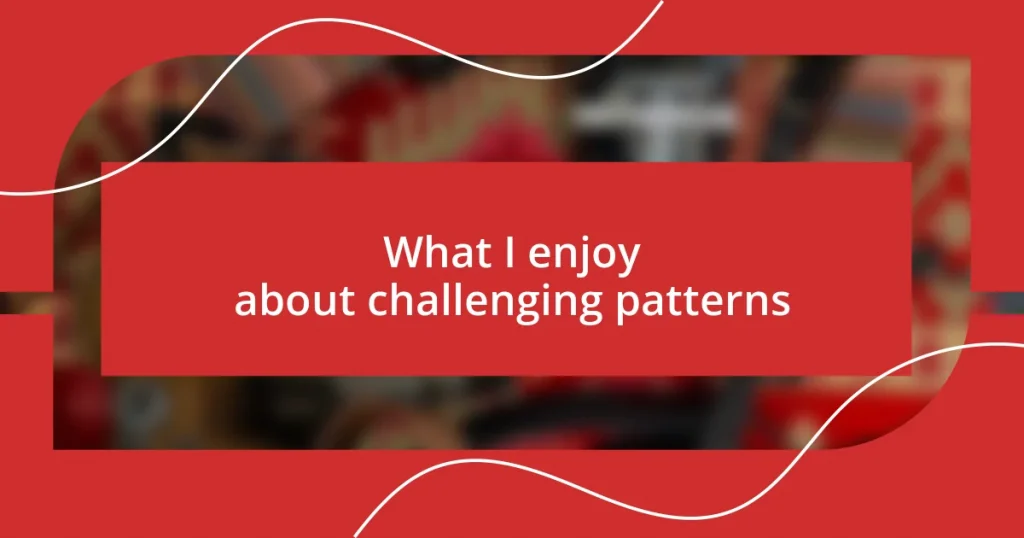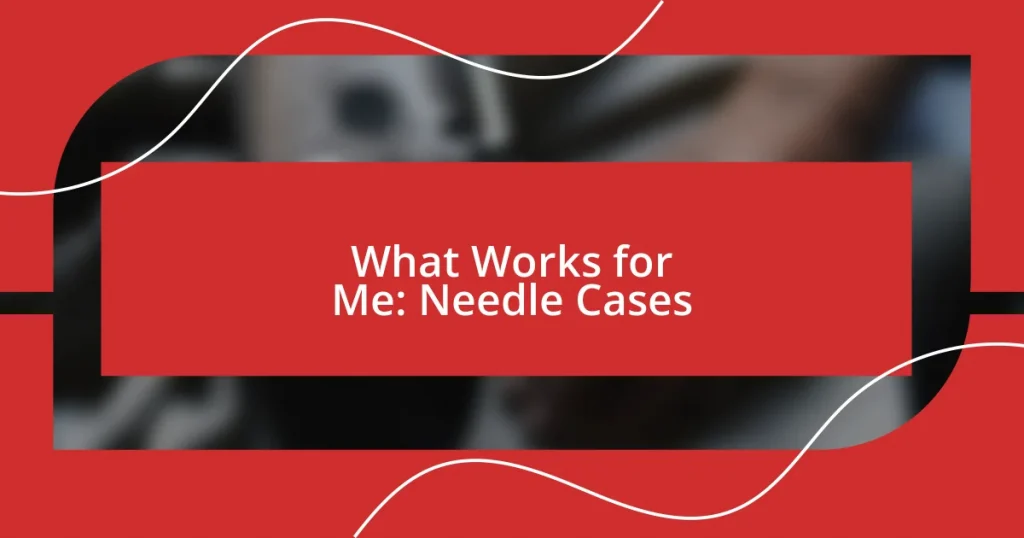Key takeaways:
- Recognizing the underlying emotions behind challenging patterns, such as fear of failure, is crucial for initiating personal change and empowerment.
- Embracing challenges fosters personal growth, problem-solving skills, and resilience, ultimately unlocking new possibilities and deeper connections with others.
- Utilizing strategies like breaking tasks into manageable steps, seeking support, and reflecting on past experiences can effectively tackle difficult patterns and enhance self-awareness.
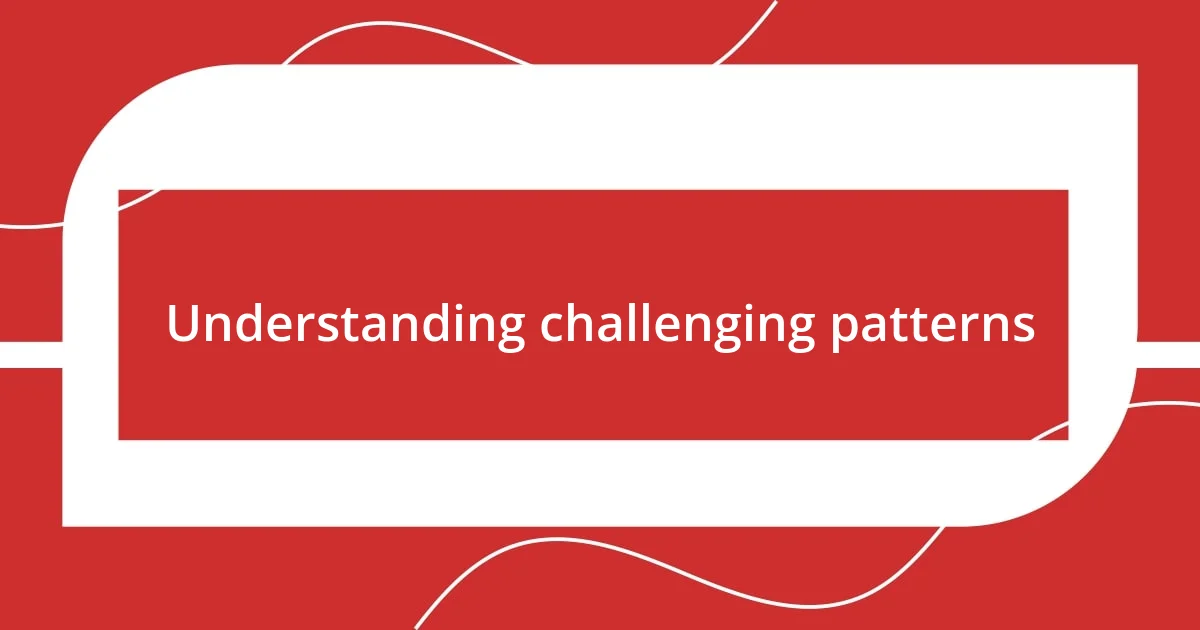
Understanding challenging patterns
Challenging patterns are often those recurring behaviors or situations that can feel frustrating or overwhelming. I remember a time when I constantly found myself procrastinating on important tasks, no matter how hard I tried to break free from that cycle. It’s as if those patterns whispered to me, convincing me that there would always be time tomorrow—a deceptive allure that many of us are familiar with.
Understanding these patterns requires a closer look at the underlying emotions driving them. For me, the fear of failure was a significant force behind my procrastination. Have you ever felt that tug-of-war within yourself? That internal conflict can be exhausting, but it opens the door to understanding not just what we do, but why we do it.
Ultimately, recognizing these patterns is the first step toward change. I recall feeling a sense of empowerment when I finally identified that fear as the root cause of my actions. It was a small victory, but it shifted my perspective completely. How powerful it can be to understand the “why” behind our behaviors!
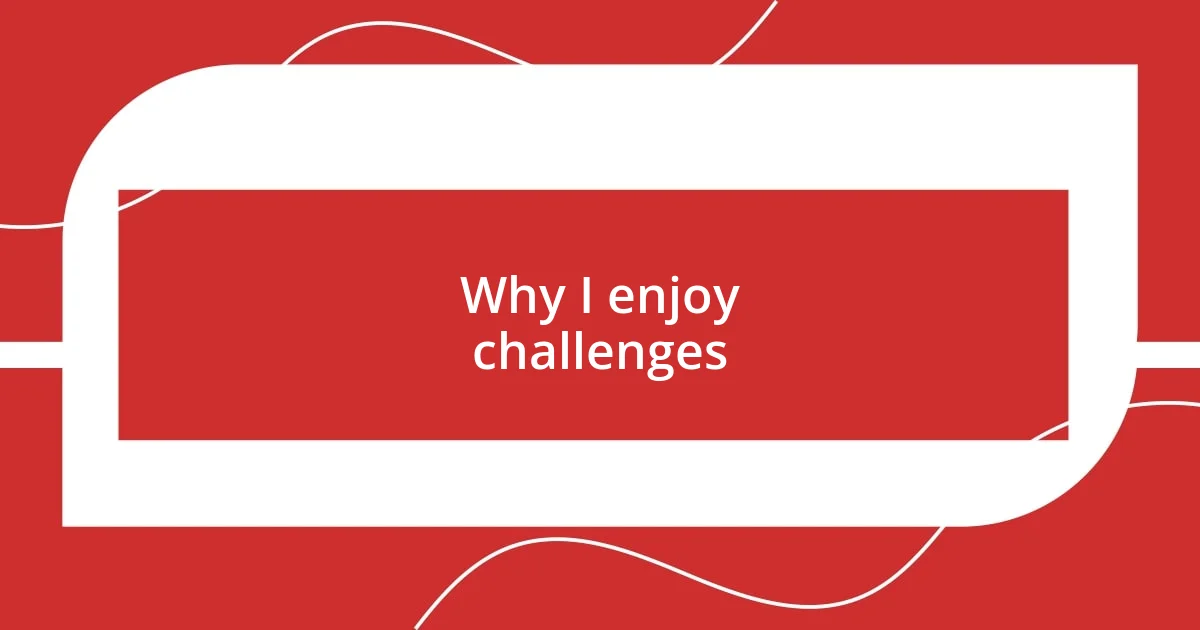
Why I enjoy challenges
I genuinely thrive on challenges because they spark my curiosity and encourage growth. There’s something invigorating about stepping out of my comfort zone. I remember tackling a complex project at work that seemed daunting at first. Instead of shying away, I dove in, and with every small success, my confidence grew. It felt like unlocking doors to new possibilities.
Here are some reasons I embrace challenges:
- Personal growth: Each challenge helps me discover new strengths.
- Problem-solving: I love the thrill of finding creative solutions under pressure.
- Resilience: Overcoming obstacles builds my confidence and makes me more adaptable.
- Joy of learning: Each experience enriches my knowledge and skills.
- Connection: Challenges often lead to collaboration and deeper relationships with others.
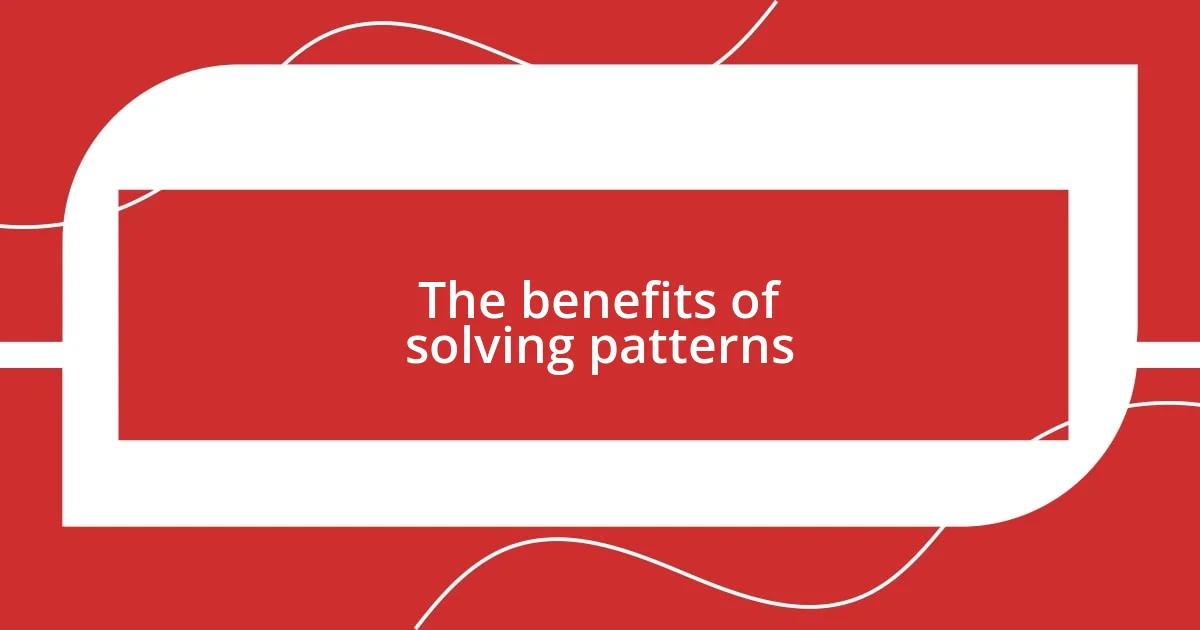
The benefits of solving patterns
Solving challenging patterns can lead to profound personal insights. I often find that when I tackle a frustrating behavior, it uncovers layers of my identity I wasn’t aware of. For instance, when I started journaling about my habits, I discovered my tendency to avoid conflict stemmed from a desire for approval. It’s a bird’s-eye view of myself that I cherish—that clarity allows me to make choices aligned with my true self.
Additionally, there’s a unique sense of satisfaction that comes from breaking a pattern. I recall a time when I was stuck in a cycle of unhealthy eating. By creating a plan and sticking to it, I felt not only healthier but more empowered. Every small victory—like choosing a nutritious option—reinforced my capability to reshape my lifestyle. It’s a reminder of how small changes can lead to significant transformations.
Finally, solving patterns enhances my problem-solving skills. Every time I face a recurring challenge, I get to think outside the box. It’s like sharpening my mental tools. I once had a creative block while working on a project. After analyzing my approach and admitting my fear of judgment, I started experimenting without fear of the outcome. This not only reignited my creativity but also taught me resilience in the face of uncertainty.
| Benefits | Personal Experiences |
|---|---|
| Self-Discovery | Journaling revealed my need for approval, enhancing my self-awareness. |
| Empowerment | Breaking unhealthy eating habits made me feel capable and in control. |
| Improved Problem-Solving Skills | Facing creative blocks allowed me to embrace experimentation and resilience. |
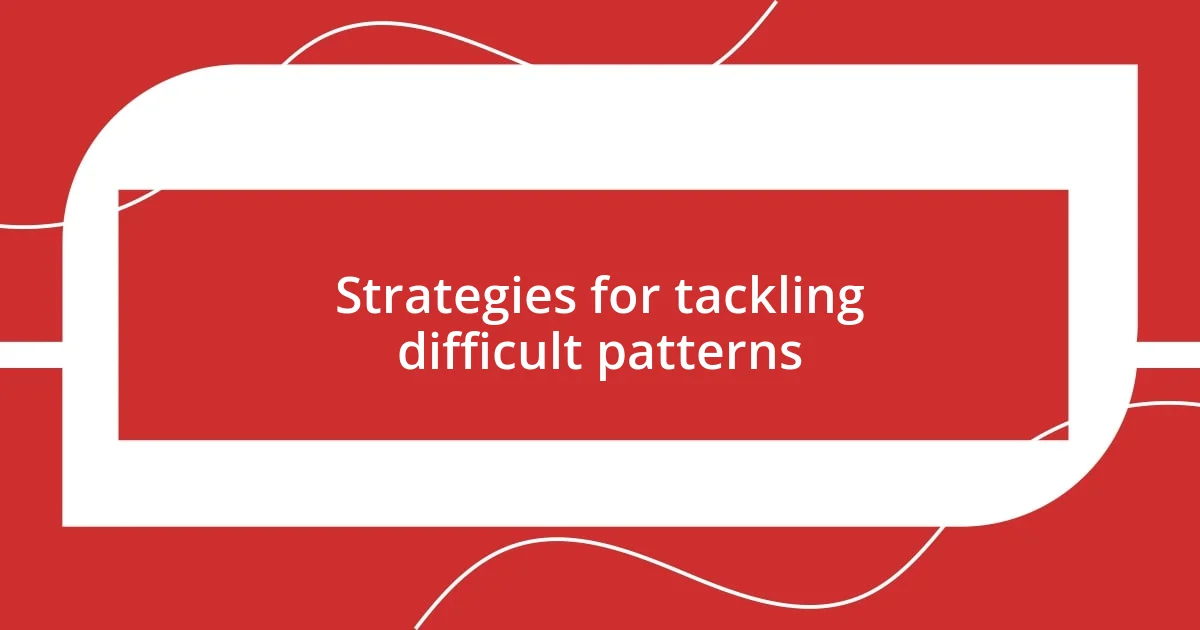
Strategies for tackling difficult patterns
When confronting difficult patterns, I’ve found that breaking them down into manageable steps can be incredibly effective. For example, during a challenging phase at work where I felt overwhelmed by repetitive tasks, I made a list of smaller, actionable items. Each completed task, no matter how small, triggered a sense of accomplishment that kept my momentum going. Have you ever experienced how tackling something bit by bit can transform the daunting into the doable?
Another strategy involves seeking support from others. I remember a particularly tough period when I struggled with procrastination. Reaching out to a friend for accountability made all the difference. Just knowing someone was cheering me on gave me the push I needed. It made me wonder—how often do we underestimate the power of community in facing our challenges?
Lastly, I’ve learned the value of reflecting on past experiences. Deep dives into my previous struggles often reveal patterns I hadn’t recognized before. After reviewing a few months of my daily routines, I noticed a trigger that led to my late-night snacking. Acknowledging this allowed me to devise a solution that worked: I started preparing healthy snacks in advance. Isn’t it fascinating how connecting the dots from earlier experiences can guide us toward effective strategies for the present?
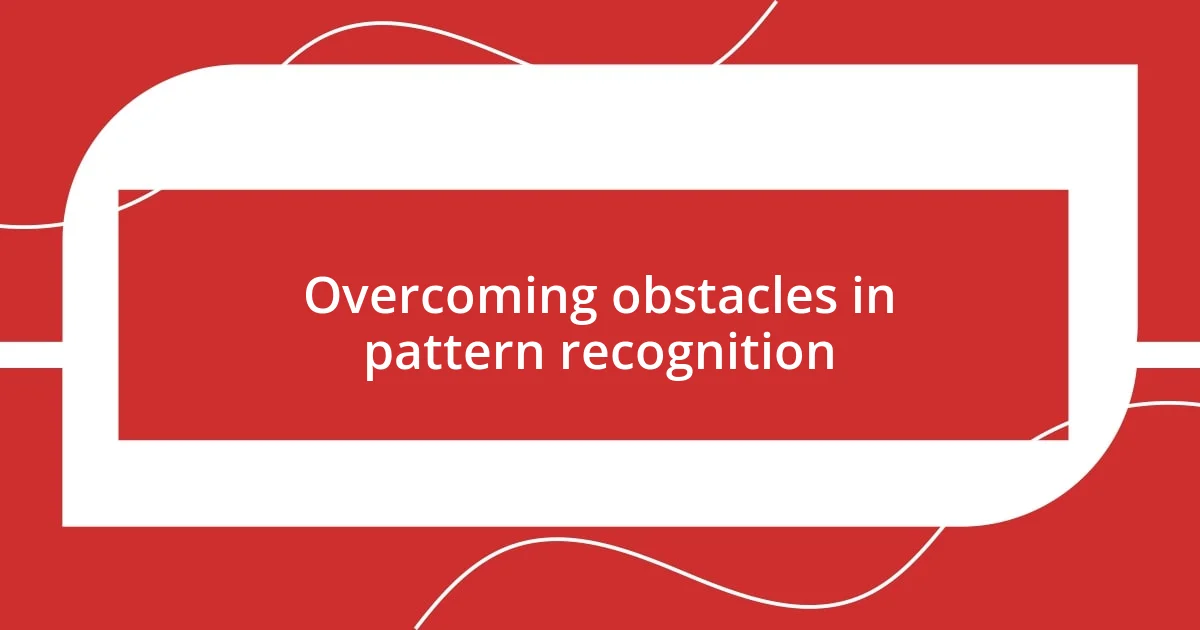
Overcoming obstacles in pattern recognition
Sometimes, I find that obstacles in pattern recognition can feel like insurmountable walls. I remember the moment I realized I was stuck in a cycle of negative self-talk. Recognizing it was one hurdle, but overcoming it was another. I had to actively challenge those thoughts by journaling—and let me tell you, that vulnerability didn’t come easy. Have you ever noticed how unearthing those tough feelings can sometimes crack open new perspectives?
Finding clarity in chaotic thought patterns is crucial. I often employ techniques like mindfulness to sift through my emotions. During a particularly stressful time, I dedicated a few minutes each day to focused breathing and reflection. This practice revealed not only triggers behind my anxiety but also provided me with coping strategies I didn’t know I needed. It’s amazing how consistency in small practices can lead to significant breakthroughs, don’t you think?
Lastly, I truly believe in the power of adaptability when it comes to recognizing patterns. There was a time when I felt I was drifting in my career, unsure of my direction. Instead of clinging to the previous understanding of what “success” looked like, I allowed myself to redefine it. I began experimenting with different roles and responsibilities, opening my mind to possibilities I had once overlooked. In facing those uncertainties, I discovered not just new skills but also newfound confidence. How often do we hold on to rigid definitions that limit our growth?










